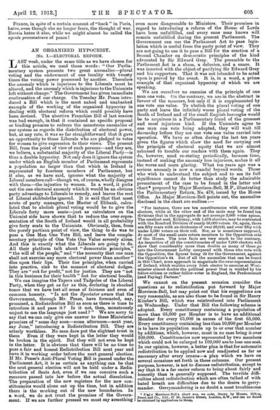TOPICS OF THE DAY.
THE EUROPEAN CRISIS.
ALINE of men roped together are descending a very dangerous piece of rock. The men are all anxious to get through without an accident, but they are overstrained, nervous, and on the verge of a panic. Besides, they have very little real confidence in each other. Ugly whispers are heard as to the good faith of this or that individual and as to his willingness to sacrifice the others if he can the better secure his own safety. These whispers, if they do not actually cause treachery, start doubts as to whether it might not be justifiable to cut the rope if the strain becomes intolerab]e. One man alone inspires con- fidence in all. They feel that he does not regard the matter from his own point of view, but from the point of view of the whole party. He is universally admitted to be honest, straightforward, and sincere, as well as cool, and thus, though he has no real command over the party, they have almost unconsciously come to look upon him as their leader. That man is Sir Edward Grey.
How can those of his countrymen who are anxious that there shall be no accident, both for the sake of the peace of the world and also in order to pre- vent the inevitable implication of Britain, help him in his work ? They can do so by giving him their confidence and support, and refraining from criticism in detail, even though they may not agree in every part of his policy. Whether they think him right or wrong in principle, and whether they like or dislike his general policy, if they want to see the peace of the world preserved they must support him, for it is only on the lines on which he is working that peace can now be assured. If peace is maintained there will be plenty of time later to apportion the blame among the Powers for the terrible risks that have been run during the past week owing to the suegestions for cutting the rope, i.e., of isolated action. Happily, as we write on Friday, there seems every reason to believe that the confidence reposed in Sir Edward Grey by the Powers has had its reward, and that he will be able to prevent the unspeakable disaster of a general European conflagration over the question whether Scutari shall or shall not be annexed by Montenegro. If that result is achieved, as we believe it now will be, it will be due in the first place, as we have said, to the confidence inspired by Sir Edward Grey, and next to his determination to deal with the question on what we may call its local merits and not to import into it the appalling dangers which must arise if it is treated, as the German Chancellor at first seemed inclined to treat it, as a part of the coming struggle between the Teuton and the Slay. It is true that the Chancellor on Wednesday explained away the words which seemed to bear this mean- ing, but the fact remains that up till Monday, when the Chancellor spoke in the Reichstag and Sir Edward Grey spoke in the House of Commons, there was a real danger that what the Chancellor now calls the catchwords of " Germanentum " and "Slaventum" might sweep away the barriers of peace and flood all Europe. As almost always happens in these cases, the great point was to gain time. With that accomplished, there was a chance of finding a way out—a chance which would grow better day by day. Not only is the peril of Scutari being made a question of Teuton versus Slav passing away, owing largely to the Russian Government having had the opportunity to show that it is not going to allow itself to b3 bluffed by Pan-Slavist demonstrations in the streets of St. Petersburg, but there has also been time for the sug- gestion of compromises which will settle the local situation in Montenegro, and prevent a catastrophe which seemed at one time only too likely to happen. If the Powers had got their way through the pressure of the naval demonstration, the Montenegrins, in their rage and humiliation, might have determined to sweep away their dynasty and so cause Austria-Hungary to take isolated action on land. Happily within the last day or two there has grown up a general feeling that if, as we admit is reasonable, Scutari (whether it falls or whether it does not fall is unessential) must, for religious and ethnological reasons, belong to the new Albanian State, Montenegro must be given compensation on a liberal scale to satisfy her amour propre and to prevent an outbreak of national feeling which might easily imperil the whole settlement in the Balkans. Discussion has shown that compensation which would amply make up for the frustration of Montenegrin hopes in regard to Scutari can be discovered. For example, the Balkan correspondent of the Times in Thursday's issue points out that if Austria-Hungary could be induced to take & wide view of the situation, she could endow Montenegro with a piece of coast-line, now in her possession but which was originally intended to belong to Montenegro, which would amply make up for the loss of Scutari. It was Austria-Hungary, the Times correspondent reminds us, who ousted Montenegro in 1878 from the maritime district of Spizza. Further, there is no reason why Monte- negro should not get to the north that expansion which she naturally desires, and which is so vital to her that she is willing to risk all to obtain it. There is another very pressing need for Montenegro which, it seems to us, the Powers can and ought to consider. Montenegro is a very poor country, and her tiny resources have been strained to the breaking-point by the present war. Her population will soon be starving. Why should not the Powers, as part of the settlement, guarantee to Montenegro a loan of, say, £1,000,000? We presume that such a loan could easily be obtained at 31 per cent. If another 2i per cent. were added for a sinking fund, the burden on each of the Great Powers need not be more than £10,000 a, year for, say, thirty or forty years. Such a sum is, of course, nothing compared with, we will not say the expense of war, but with the expenses which must be incurred by the Great Powers by another month of distrust and anxiety, even if such distrust and anxiety did not in the end lead to hostilities. Montenegro must not, of course, be encouraged, as it were, to blackmail the Powers, but on the other hand must be made to realize that it is impossible to expect that after the sacrifices made by Montenegro in the war she alone of the Allies is to get virtually nothing out of the settlement. We can well understand an excitable and quixotic people like the Montenegrins preferring national suicide to that. To put so terrible a dilemma as Austria-Hungary seemed at first inclined to put before the Montenegrins would have been a capital error in diplomacy.
Though on the whole we are now hopeful, we must not, of course, blind our eyes or those of our readers to the fact that there is still a possibility, or rather many possibilities, of slips between the cup and the lip. To be quite frank, the real danger is Austria-Hungary. If she insists upon being unreasonable and blind to her own essential interests, the greatest of which is emphatically peace ; if, that is, she insists upon treating the whole matter as a fight between Teuton and Slav, or shall we say Teuton-cum-Magyar and Slav, there is no limit to the disaster which she may create. Though for the moment the Pan-Slavist agitation has died down in Russia, and though there can be no doubt of the complete bona fides of the Russian Government and of their desire for peace, the Russian Government cannot perform miracles. By this we mean that it will always be possible for Austria-Hungary so to flog up Pan-Slavist sentiment as to make peace impossible. In a word, there is no good blinking the fact that on Austria-Hungary depends the question of peace or universal war. We say "universal" advisedly, for if war comes this country will not be able to keep out of it. Many of our readers will no doubt ask us whether we really mean to suggest that it is possible that Britain might become involved in a war over Scutari or in a war of Teuton versus Slay. If the problem could be put in this simple fashion we should no doubt say "No. Britain ought not to be involved in such a war." Unhappily if we once get to the point of war it will be found quite impossible to state it in this simple fashion. The question we shall have to decide, if war comes, is, "Can we afford to run the risk of letting France be overwhelmed and destroyed by the central European Powers ?" If we cannot run that risk, as most assuredly we cannot, we must stand by France. And remember that this is not the only reason for boldly facing the fact that at all costs we must stand by France. This is not merely the path of honour and of safety, but in the last resort the only path by which peace might even at the last moment be snatched from out the jaws of war. If Germany knows and Austria-Hungary knows and Italy knows that in the last resort, and be the apparent merits what they may, we shall stand by Ressia and France, there will not be war. France, in spite of a certain amount of "buck" in Paris, hates, even though she no longer fears, the thought of war. Russia hates it also, while we might almost be called the agents provocateurs of peace !











































 Previous page
Previous page